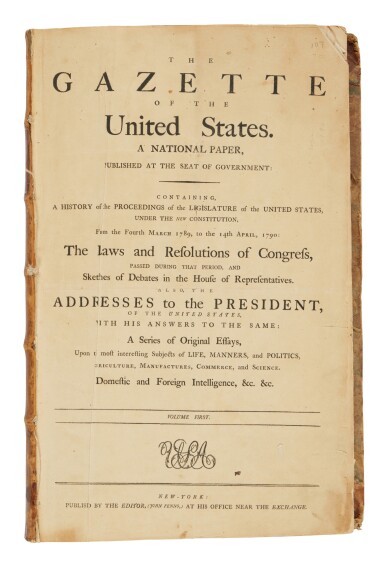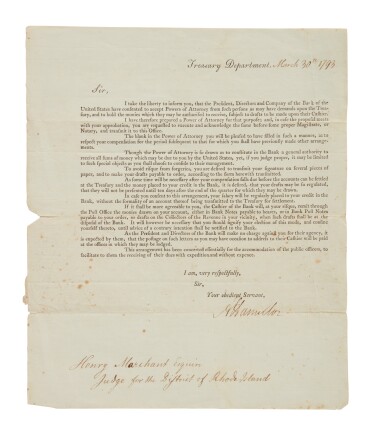UNITED STATES, TREASURY DEPARTMENT. [HAMILTON, Alexander] Treasury Department, December 13, 1790. In Obedience to the Order of the House of Representatives, of the ninth Day of August last, requiring the Secretary of the Treasury to prepare and report, on this Day, such further Provision as may, in his Opinion, be necessary for establishing the Public Credit--the said Secretary further Respectfully Reports , [on the National Bank]. New York: Francis Childs and John Swaine 1790. 2 o (13¼ x 8½ in.). 22pp. (upper corners of pp.1, 20 and 21 lightly browned, tiny wormhole to first eight leaves, catching a few letters), stabbed and sewn, uncut, AS ISSUED in thin blue paper protective wrappers (minor wear and slight soiling at edges). FIRST EDITION, containing Hamilton's proposals for the establishment of a national bank, constituting a follow-up to his report on the Public Credit, delivered in January 1790. VERY RARE. Evans 23006 -- [HAMILTON, Alexander] Treasury Department. December 13, 1790. In Obedience to the Order of the House of Representatives...requiring the Secretary of the Treasury to prepare and report...such further Provision...necessary for establishing the Public Credit--the said Secretary further Respectfully Reports , [on funds for excise and duties on imports]. New York: Francis Childs and John Swaine 1790. 2 o (13¼ x 8½ in.). 7pp. (fore-margins lightly browned), stabbed and sewn, uncut, AS ISSUED in thin blue paper protective wrappers (acid holes from owner's inscription on front wrapper). FIRST EDITION. VERY RARE. Evans 23005. Two influential and very rare supplemental reports of Hamilton issued during the eventful First Congress, expanding upon and justifying the historic proposals contained in his January 1790 Report on the Public Credit (Evans 22998). The first report presents Hamilton's plan for a national bank. In it, Hamilton maintains that "from a conviction... that a National Bank is an institution of primary importance" to the nation's prosperity, "his attention has been drawn to devising the plan of such an institution." He then outlines in considerable detail the advantages of such a bank and persuasively rebuts the principal objections to it. On pages 17 through 19, Hamilton submits to the consideration of the House his specific "plan for the constitution of a National Bank," organized in 24 numbered articles. "Hamilton recommended that Congress grant charter to a corporation to be called the Bank of the United States. Its capitalization was to be $10 million, more than four times as much as that of the three existing banks combined and far more than the amount of all the gold and silver in the country. The United States would subscribe for $2 million of the stock, payable in cash...The plan was almost poetic in its beauty and symmetry," on authority notes, and "the very creation of the bank would establish the public credit on an enduring basis" (F. MacDonald, Alexander Hamilton: A Biography , pp.193-194). In the second report here, Hamilton makes recommendations for meeting the anticipated interest payments due on the debts of the states incurred during the revolution and assumed by the Federal government. He calls for increased duties on imported spirits and an excise tax on whiskey and other liquors distilled within the U.S. This report, "was more than just the reiteration of a tax proposal," for "Hamilton spelled out the principles on which he was acting, treating Congress to a small lecture on taxation" ("MacDonald, p.196). Provenance : Samuel Johnston (1733-1816) of South Carolina, with his signature on the first page of each report, the front wrapper of the first labeled: "Treasury Bank S. Johnston"; front wrapper of the second labeled "Report of the Treasury." (2)
UNITED STATES, TREASURY DEPARTMENT. [HAMILTON, Alexander] Treasury Department, December 13, 1790. In Obedience to the Order of the House of Representatives, of the ninth Day of August last, requiring the Secretary of the Treasury to prepare and report, on this Day, such further Provision as may, in his Opinion, be necessary for establishing the Public Credit--the said Secretary further Respectfully Reports , [on the National Bank]. New York: Francis Childs and John Swaine 1790. 2 o (13¼ x 8½ in.). 22pp. (upper corners of pp.1, 20 and 21 lightly browned, tiny wormhole to first eight leaves, catching a few letters), stabbed and sewn, uncut, AS ISSUED in thin blue paper protective wrappers (minor wear and slight soiling at edges). FIRST EDITION, containing Hamilton's proposals for the establishment of a national bank, constituting a follow-up to his report on the Public Credit, delivered in January 1790. VERY RARE. Evans 23006 -- [HAMILTON, Alexander] Treasury Department. December 13, 1790. In Obedience to the Order of the House of Representatives...requiring the Secretary of the Treasury to prepare and report...such further Provision...necessary for establishing the Public Credit--the said Secretary further Respectfully Reports , [on funds for excise and duties on imports]. New York: Francis Childs and John Swaine 1790. 2 o (13¼ x 8½ in.). 7pp. (fore-margins lightly browned), stabbed and sewn, uncut, AS ISSUED in thin blue paper protective wrappers (acid holes from owner's inscription on front wrapper). FIRST EDITION. VERY RARE. Evans 23005. Two influential and very rare supplemental reports of Hamilton issued during the eventful First Congress, expanding upon and justifying the historic proposals contained in his January 1790 Report on the Public Credit (Evans 22998). The first report presents Hamilton's plan for a national bank. In it, Hamilton maintains that "from a conviction... that a National Bank is an institution of primary importance" to the nation's prosperity, "his attention has been drawn to devising the plan of such an institution." He then outlines in considerable detail the advantages of such a bank and persuasively rebuts the principal objections to it. On pages 17 through 19, Hamilton submits to the consideration of the House his specific "plan for the constitution of a National Bank," organized in 24 numbered articles. "Hamilton recommended that Congress grant charter to a corporation to be called the Bank of the United States. Its capitalization was to be $10 million, more than four times as much as that of the three existing banks combined and far more than the amount of all the gold and silver in the country. The United States would subscribe for $2 million of the stock, payable in cash...The plan was almost poetic in its beauty and symmetry," on authority notes, and "the very creation of the bank would establish the public credit on an enduring basis" (F. MacDonald, Alexander Hamilton: A Biography , pp.193-194). In the second report here, Hamilton makes recommendations for meeting the anticipated interest payments due on the debts of the states incurred during the revolution and assumed by the Federal government. He calls for increased duties on imported spirits and an excise tax on whiskey and other liquors distilled within the U.S. This report, "was more than just the reiteration of a tax proposal," for "Hamilton spelled out the principles on which he was acting, treating Congress to a small lecture on taxation" ("MacDonald, p.196). Provenance : Samuel Johnston (1733-1816) of South Carolina, with his signature on the first page of each report, the front wrapper of the first labeled: "Treasury Bank S. Johnston"; front wrapper of the second labeled "Report of the Treasury." (2)













Testen Sie LotSearch und seine Premium-Features 7 Tage - ohne Kosten!
Lassen Sie sich automatisch über neue Objekte in kommenden Auktionen benachrichtigen.
Suchauftrag anlegen